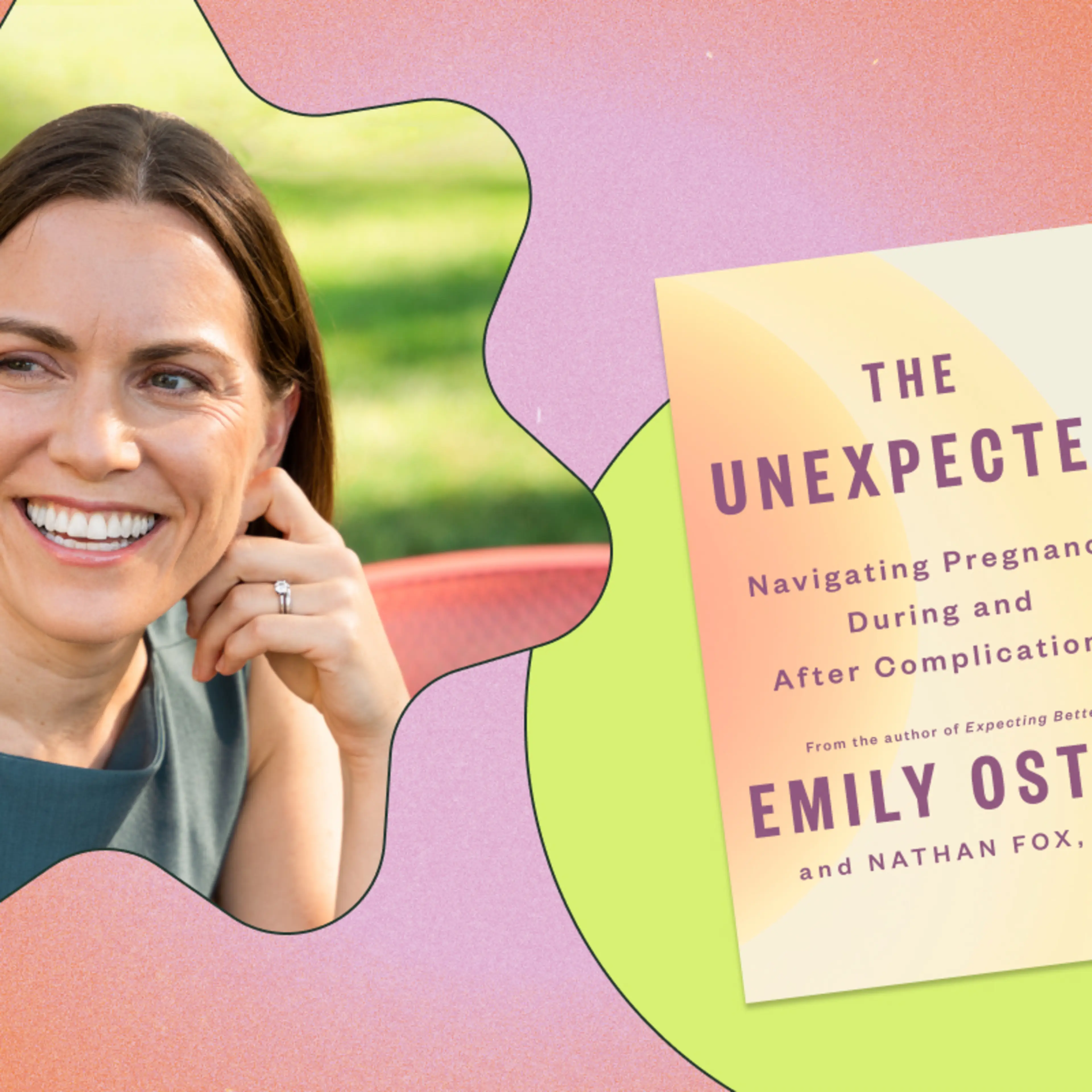“It’s always home renovation shows,” my best friend told me, pointing to the flatscreen TVs that dotted the walls of the tony waiting room of her Beverly Hills fertility clinic. “It’s supposed to keep us calm.”
Her husband hadn’t been able to come to this appointment, so I went in his place. I hired a sitter to watch my toddler and baby and drove the sun-washed streets of Los Angeles to meet her. We were there for an eight-week appointment, to check the progress of her latest pregnancy. But this wasn’t her first rodeo.
I looked around at the other women and couples in various states of ease or discomfort, distracting themselves with magazines and the silent DIY choreography of HGTV. It reminded me of visits to my OB and yet…not.
We’ve been friends since we were nineteen years old, me and my bestie, who we’ll call “M.” We met in our college theatre department. M. was more beautiful than me, and a more naturally gifted actress. Because I was young and dumb, I hated her at first. Then I got to know her and fell irrevocably in love. We figured out lust and relationships and heartbreak together and spent long nights drinking wine and watching Moulin Rouge, swept into the spell that was early 2000’s Ewan MacGregor.
Now, I watched as she greeted the staff at the fertility clinic, all of them lighting up at the sight of her. They were tender with M., as it had been a long road already with a lot of loss. Even this pregnancy, which made us both exhale a long-held breath when the glittering-fast heartbeat hummed in our ears during that visit, would be gone several weeks later. These nurses and techs and receptionists, they understood the precariousness of her joy in a way that I had been slower to catch on to.
When M. first started fertility treatments, I was clueless about the physical, mental, and emotional toll the process would have on her. In those early days, I screwed up a lot. I put my foot in my mouth. I made off-hand remarks that I later learned stung for days. I overstepped and underperformed and generally got it wrong.
Over six years of our friendship, while I had babies number one, two, and three, M. went through innumerable fertility treatments and pregnancies that disappeared as quickly as they arrived. She supported me with full-heartedness as I mucked my way through new motherhood and breastfeeding and the kind of sleep deprivation I’d never wish on anyone.
I started to feel my own blunders in sharp relief, as she continued to show up for me. I knew it had to be painful for her, but I didn’t know the exact shape of the pain. I just knew I didn’t want to see the little wince that would flash across her face when I said something unhelpful. So I decided to educate myself.
I learned what to do, and what not to do when supporting a friend who is struggling to conceive or going through fertility treatments. To be a steady partner and support system, you need to expand your knowledge of what people in M.’s position are going through. So in hopes of helping you keep your own foot far from your mouth, I’d like to share a few pertinent do’s and don’ts for supporting a friend who is TTC.
Don’t Suggest Solutions
Adoption, surrogacy, other clinics, the thing your other friend did—trust me, she’s already heard it all. She’s probably researched, agonized over, or done most of it already. Your well-meaning suggestions are going to make your friend feel like the hamster wheel she’s on has just been thrown into overdrive yet again. Spare her your suggestions.
Don’t Tell Stories of Miracle Babies
The woman who gave away all the baby stuff only to find out she was pregnant the next day, the cousin who finally “gave up” and got pregnant with twins naturally. These stories have a hidden implication that if your friend could just relax and “forget about it,” she would get pregnant, which is A. untrue, B. impossible (you try relaxing while your body is pumped full of hormones), and C. just more kindling on the fire of self-recrimination and “why won’t my body work” shame that’s probably already burning.
Women struggling with fertility are told, in a million subtle ways, that infertility is somehow their fault. They get told to relax, to visualize, to have positive attitudes as if pregnancy is a gift bestowed only on the deserving. All you need to do is take one look at the world around you—the parents of every sort and level of competency—to know that this is false. All kinds of people become parents, not just the good ones. But for some reason when getting pregnant doesn’t come easily, women are told that the environment of their body is part of the problem. As if they must be endlessly calm and harmonious to receive the great gift of pregnancy.
I’ve had three children and I promise you: things were not always calm and harmonious while making or carrying them. Do everything you can not to add to this falsehood.
Don’t Make Her Show Up for Kid Stuff
Baby showers, gender reveals, first birthdays, baptisms, christenings: invite her, yes, but make it very clear that you don’t expect her to come, your feelings won’t be hurt if she doesn’t come, and that you love her all the same. Then, mean it. Don’t hold on to resentment or aggravation. I promise you, she wants to be there, but these events can be extraordinarily painful for someone going through fertility treatments.
I made the mistake of inviting M. to a baby blessing ceremony when I was pregnant with my second. She was so close with my daughter, and I knew she’d dote as much on this second baby. I wanted her beside us as we dusted the threshold for our new arrival, and she knew it was meaningful to me, so she agreed to come. But I should have told her not to. Of my close friends in attendance, several of them arrived with their newborns. Others were pregnant. Almost all of them already had children. All morning I saw the heartbreak blooming behind M.’s cheeks.
It was selfish of me to want her there. If I had to do it over, I would tell her, “I love you, I know you’ll be there in spirit. Don’t come.”
Don’t Ask or Prod or Sniff Around for Information
Let her come to you. A genuine, “how are you?” Is enough to get the conversation started if she wants to get into it. Constantly checking in about how it’s all going can inadvertently add pressure to an already pressurized situation. Just be available and open and empathetic and I promise you, she’ll tell you what you need to know in a time that’s right for her.
Do Your Research
If you don’t know anything about what it’s like to struggle to conceive, there are thousands of resources out there for you. Learn about the mechanics and the science, but also find stories from other women who are either going through or have been through the process.
I started listening to a podcast hosted by a couple going through IVF. They would tell their own stories, answer questions from listeners, and generally wax poetic on the horror-show of fertility treatments. It gave me a much broader view of the shared struggles of women (and men) in this process and helped me learn better ways to be present.
Do Offer Tangible Support
Can you accompany her to an appointment? Help her research a nagging question? Connect her to someone else you know who has been through it? Going through IVF, or any other fertility treatment is expensive, time-consuming, and an emotional and physical rollercoaster. Anything you can do to offset any of these struggles, will be appreciated.
Do Listen
The thing M. needed most while she was undergoing IVF was an ear. Someone to hear her out, with compassion. To validate what she was feeling and mourning and railing against. Often, I would just tell her how sorry I was she was going through it.
When our friends are suffering, we want to help. We want to bandage and distract and reassure because if we don’t then we’re just stuck with our own helplessness. Deep listening is all of this. It’s bandage and salve for open wounds. It can be hard to stand with someone in their big feelings—rage, despair, hopelessness—but sometimes to be a friend is to be a vessel, an open container to help them hold what feels unholdable.
M. is a mother now. She’s as glorious a mom as I knew she would be, but her struggle stays with her. It marked her, changed her shape ever so slightly. She has loved and lost and walked barefoot from despair to hope more times than any of us should. If I didn’t know better, I would tell you that it was all worth it, because she has her beautiful daughter now. As if that’s the natural and obvious conclusion to this story.
Plenty of women end their fertility journey without becoming mothers. There’s no equation, no math that can get you from no child to child other than time and biology. I’m so happy M. is a mom. I’m so proud of how she came out the other side, but I bet she would ask me not to make hers into a story of triumph and redemption.
So, I won’t.
All I will say is that if you have a friend who is anywhere along this path and you love her, study up. Learn what you can do to support her, learn the toll that fertility treatments take on women’s bodies and minds, listen to her when she tells you what helps and what hurts. Or just listen, period. If you haven’t been through it yourself, don’t assume you know what it’s like. Let her tell you. Let other women who have gone through it, tell you. Then take what they’ve given and use it to be a warm nest, an open field, a space she can pour her hardest feelings into.
You may not be able to fix any of it, there may not be a happy ending on the other side, but at least you can be a light in the darkness.











